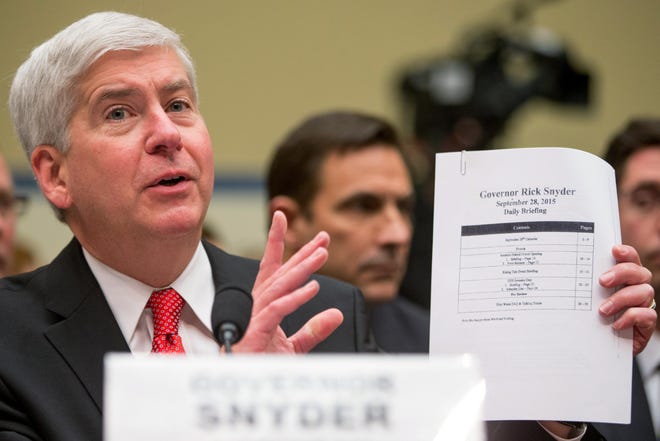Michigan sends 'tens of thousands' of Flint-related records to Congress
 Melissa Nann Burke
Melissa Nann Burke
Washington — Michigan officials have provided congressional investigators with tens of thousands of documents related to the Flint water crisis since the start of the year.
The office of Michigan Attorney General Dana Nessel is continuing to work "cooperatively" with the House Oversight and Reform Committee to produce the documents that the panel requested, Nessel spokesman Dan Olsen said this week.
"Our office has already supplied the committee with tens of thousands of pages of documents, and we are diligently working to send the rest," Olsen said.
Olsen added that, while some of the records provided to the committee have been submitted previously, "most of these pages of documents are new."
The Attorney General's Office is sending the documents in response to Oversight Chairman Elijah Cummings of Maryland, who in late December wrote to then-Gov. Rick Snyder asking he "fully comply" with the committee's 2016 bipartisan request for documents related to the water crisis.
Snyder, a Republican, left office at year's end, and Gov. Gretchen Whitmer, a Democrat, has said her administration would work with Nessel to help in collecting documents requested by the committee.
A Cummings spokeswoman said committee offices were closed Friday for the holiday weekend.
Snyder’s office had maintained that he has supplied to the House committee all of the requested documents.
His office previously said it provided the Oversight committee with tens of thousands of pages of documents, in addition to records from the state's attorney general, health and environmental departments.
Cummings last year had promised to reopen the Flint investigation when Democrats took over the U.S. House in January, telling The Detroit News last year, "I’m not done with Flint."
The House Oversight chairman also suggested he might bring Snyder back before Congress.
Snyder testified before the Republican-controlled House committee in March 2016, when Cummings and other Democrats called on him to resign.
Cummings later raised questions over whether Snyder had lied during his testimony about when he learned about the 2014-15 Legionnaires' disease outbreak in the Flint area.
The questions followed contradictory testimony in an involuntary manslaughter preliminary exam by Snyder's urban issues adviser.
Snyder stuck by his testimony, but that didn't satisfy Cummings and other Democrats.
Former House Oversight Chairman Jason Chaffetz, R-Utah, had closed the committee's Flint inquiry in December 2016 over the protests of Cummings, who called the move premature and "inconceivable" at the time.
Without knowing their content, it’s anyone’s guess what the impact of the new documents might be, said Peter Henning, a former federal prosecutor.
“There was some talk of looking at whether Snyder had told the truth before Congress, but that was a real stretch to try to make out a perjury case against the former governor,” said Henning, now a law professor at Wayne State University.
That's because Snyder kept his statement "vague enough" when he said he wasn’t fully aware at a certain point in time, Henning added.
"Somebody saying 'there might be a problem here' doesn’t necessarily establish his knowledge of what happened in Flint," the law professor said.
“Maybe they’re looking to make that into a perjury case but, at this point in time, I rather doubt it. I think they’re much more interested in finding out the root of the problem and not as much in pinning blame on someone.”
It might seem unusual that a different administration would find so many more documents to produce than the last, but Henning said there are different ways to read document requests.
“They may well have thought they complied with it fully, but you can always inundate with documents,” he said.
“It’s going to depend on what they’re providing and how much of it is duplicative, how much is new, how relevant is it and how much additional light it is going to shed on what happened in Flint. We don’t know at the moment.”
The records that Cummings requested from Snyder in December included copies of all of Snyder's daily briefings that included the Flint water crisis and public complaints about Flint's water quality.
Cummings also sought testing results from Flint's water concerning Legionella bacteria or Legionnaires' disease and documents relating to when Snyder became aware of the Legionnaires' disease outbreak in the Flint region.
Twelve people died and at least another 79 were sickened by the respiratory disease during the two-year period.
In February 2016, the Snyder administration released a trove of more than 24,000 pages of Flint-related documents among local, state and federal officials.
In his testimony before Congress, Snyder accepted responsibility for not questioning the conclusions of state experts on Flint's water quality after the city shifted its water source from the Detroit area water system to the Flint River.
But Snyder blamed Michigan Department of Environmental Quality officials for not telling him about lead-contaminated water, maintaining he did not know about elevated lead levels until shortly before he announced an action plan in October 2015.
Urban affairs aide Harvey Hollins had testified in Michigan that he informed the governor about the Legionnaires’ outbreak in December 2015 but didn't indicate what he specifically told Snyder about the Legionnaires’ cases.
The former governor has insisted he first learned about it in mid-January 2016, just before he informed the public about it in a hastily arranged press conference in Detroit.
A federal judge this month ruled that a major class-action lawsuit over the Flint water crisis could move forward, reinstating claims against Snyder.
Henning said the class-action suit and other Flint lawsuits are far more important than what is happening on Capitol Hill.
"I don’t think we’ll see much come out of Capitol Hill. There might be another round of hearings, but this is more of a state issue than the federal government."
In Michigan, a special prosecutor has convinced judges to bind over for trial two Snyder health officials with involuntary manslaughter and other crimes.
Two state-appointed emergency managers also have been criminally charged.
mburke@detroitnews.com